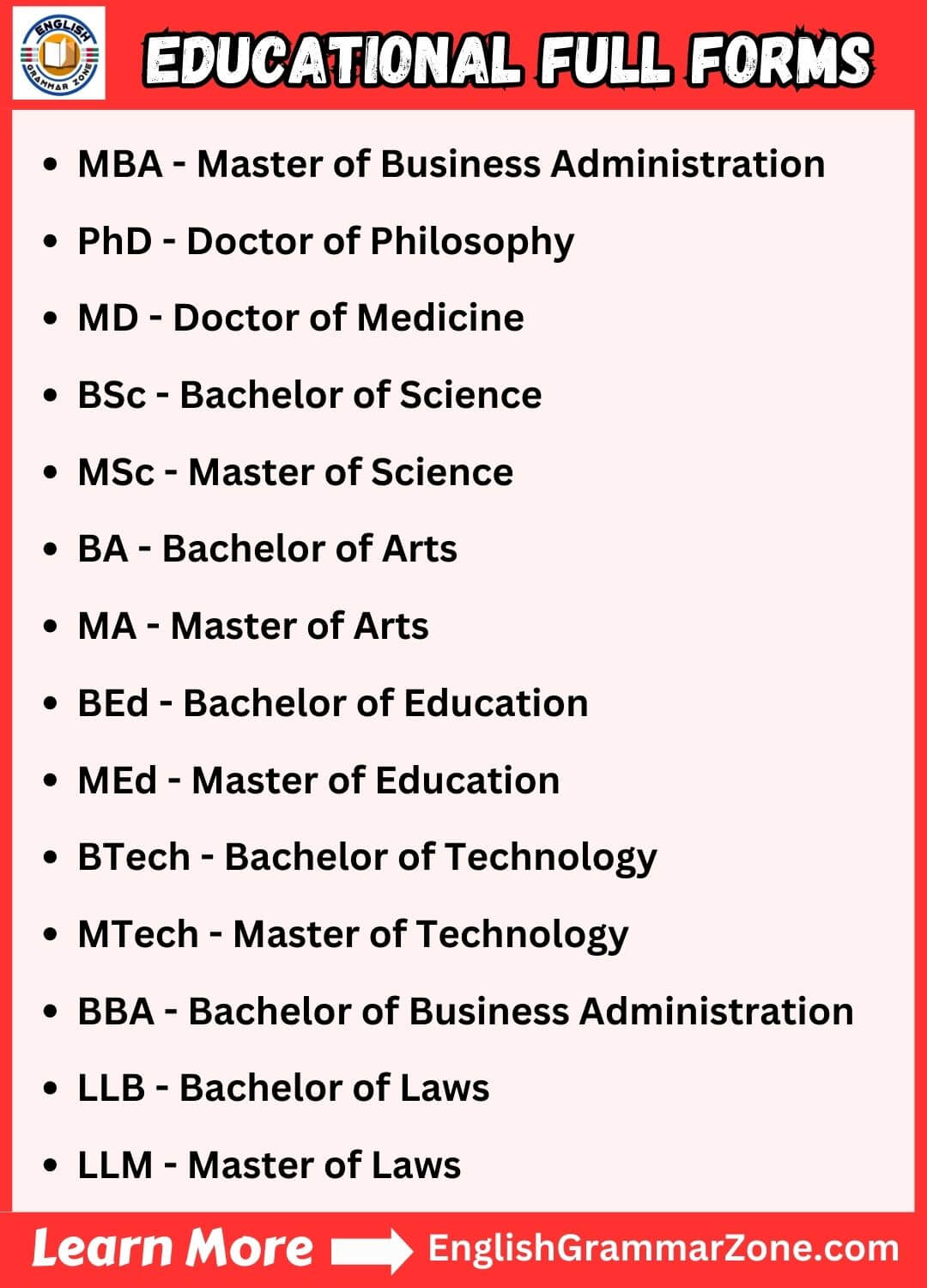Job Market and Essential Educational Degrees and Certifications Learn about how the right qualification will advance your career prospects, job opportunities, and skills.
42 Essential Educational Degrees and Certifications
- MBA – Master of Business Administration
- PhD – Doctor of Philosophy
- MD – Doctor of Medicine
- BSc – Bachelor of Science
- MSc – Master of Science
- BA – Bachelor of Arts
- MA – Master of Arts
- BEd – Bachelor of Education
- MEd – Master of Education
- BTech – Bachelor of Technology
- MTech – Master of Technology
- BBA – Bachelor of Business Administration
- LLB – Bachelor of Laws
- LLM – Master of Laws
- BCom – Bachelor of Commerce
- MCom – Master of Commerce
- BE – Bachelor of Engineering
- ME – Master of Engineering
- BCA – Bachelor of Computer Applications
- MCA – Master of Computer Applications
- DDS – Doctor of Dental Surgery
- DVM – Doctor of Veterinary Medicine
- PharmD – Doctor of Pharmacy
- DPT – Doctor of Physical Therapy
- OT – Occupational Therapy
- PT – Physical Therapy
- RN – Registered Nurse
- LPN – Licensed Practical Nurse
- RT – Respiratory Therapy
- CNA – Certified Nursing Assistant
- AS – Associate of Science
- AAS – Associate of Applied Science
- AA – Associate of Arts
- ABA – Applied Behavior Analysis
- ECE – Early Childhood Education
- ESL – English as a Second Language
- GED – General Educational Development
- GRE – Graduate Record Examination
- GMAT – Graduate Management Admission Test
- TOEFL – Test of English as a Foreign Language
- IELTS – International English Language Testing System
- SAT – Scholastic Assessment Test

The Role of Certifications and Essential Educational Degrees in Career Success
In the contemporary job market, keys to educational qualifications and certificates have gained all the more significance for you. Whether you are beginning your job or seeking growth in your present job, obtaining the right qualifications at the right time would have long-lasting effects on your profession. A prestigious course can enhance both your skills as well as employability.
Your educational background with a bachelor’s or master’s degree forms the basis of your career. They offer specialized knowledge in a field of study and are commonly necessary for many entry-level and advanced jobs. Still, over the years certifications have taken on an equal degree of importance in many industries or professions that require continuous learning and industry knowledge. Professional certifications (for example, in information technology, project management, or healthcare) validate your skills and show your commitment to remain current with industry trends.
Some qualifications help you stand out among a crowd of similar applicants, we have summarized the 10 Essential Educational Qualifications or Certificates. Years before certifications emphasized the implementation of a specialized set of skills, degrees gave you the theoretical/holistic approach to the topic at hand. Combining all of these skills is sure to make you more employable and able to land in a higher-paying position.
Additional Tips: Essential Educational Degrees and Certifications
Discover the Industry Trends: Research what specific qualifications are required in your industry of choice. Some industries — including tech, health care, and finance — require certifications in order to remain competitive.
Commit to Lifelong Learning: Beyond formal education and certifications that may be essential, you could take things up a notch and go with online programs, workshops, and webinars to keep your skills up to date.
Capitalize on Certifications for Career Change: Certifications will allow you to transition to a new field by equipping knowledge at a short time.
Asses Cost And Time Investment: Certifications may provide a faster and more cost-effective option than obtaining a formal degree, make sure the certifications are reputable and recognized by a recognized body in your field.
Network with professionals: Connect with professionals through professional groups or attend industry events where you can meet other people with similar degrees and certifications. It opens up new doors and gives a perspective as to what career success can look like.
New degree programs, professional certifications, and paths can drive interest among students, and with the right degree(s) and certification(s), you can open up multiple career opportunities and ensure success for many years to come.
Conclusion:
All in all, Essential Educational Degrees and Certifications are important for professional progression. Many people think of them as a process that gives you the knowledge, skills, and credibility to succeed in your profession. It can also set you apart in the job market if you have a degree or have certifications. Continuing education will also help ensure you are an attractive candidate for any opportunities that arise.